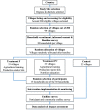Promoting insect farming and household consumption through agricultural training and nutrition education in Africa: A study protocol for a multisite cluster-randomized controlled trial
- PMID: 37467293
- PMCID: PMC10355422
- DOI: 10.1371/journal.pone.0288870
Promoting insect farming and household consumption through agricultural training and nutrition education in Africa: A study protocol for a multisite cluster-randomized controlled trial
Abstract
Background: Edible insects are a sustainable source of high-quality animal protein. Insect farming is gaining interest globally, particularly in low-income countries, where it may provide substantial nutritional and economic benefits. To enhance insect farming practices in Africa, new farming systems are being developed. However, knowledge on how to best promote uptake of these systems is lacking. This study aims to fill this gap by investigating the effectiveness of educational interventions in promoting insect farming for household consumption in Africa.
Method: The study is designed as a multi-site randomized controlled trial to evaluate the impacts of agricultural training alone or in combination with nutrition education on the adoption of insect farming in Ghana, Kenya and Uganda. In each of the three countries, ninety-nine villages are randomly assigned to one of three arms: two intervention arms and a control arm with no interventions. Focusing on production (P), the first intervention arm covers agricultural training on insect farming combined with provision of insect production starter kits. Focusing on both production and consumption (PC), the second intervention arm involves the same intervention components as treatment P plus additional nutrition education. The impacts of the interventions are measured by comparing baseline and endline data collected one year apart. Primary outcomes are adoption of insect farming and consumption of the farmed insects.
Discussion: Understanding the drivers and impacts of novel agricultural practices is crucial for transitioning to sustainable food systems. The current project is the first to investigate how educational interventions promote insect farming for household consumption in low-income countries. The results will contribute evidence-based knowledge to support sustainable development through insect farming in Africa.
Trial registration: The protocol is registered in the American Economic Association registry for randomized control trials with registration number AEARCTR-0009996. Initial registration date: 02 September 2022, last updated 17 May 2023.
Copyright: © 2023 Alemu et al. This is an open access article distributed under the terms of the Creative Commons Attribution License, which permits unrestricted use, distribution, and reproduction in any medium, provided the original author and source are credited.
Conflict of interest statement
The authors have declared that no competing interests exist.
Figures
References
-
- World Bank. Making development climate resilient: A world bank strategy for sub-saharan africa. 2009.
-
- Ringler C, Zhu T, Cai X, Koo J, Wang D. Climate change impacts on food security in sub-saharan africa. Insights from Comprehensive Climate Change Scenarios2010.
-
- OECD/FAO. Oecd-fao agricultural outlook 2016–2025. Paris: OECD Publishing; 2016.
-
- Parodi A, Leip A, De Boer IJM, Slegers PM, Ziegler F, Temme EHM, et al. The potential of future foods for sustainable and healthy diets. Nature Sustainability. 2018;1(12):782–9.
-
- Verner D, Roos N, Halloran A, Surabian G, Tebaldi E, Ashwill M, et al. Insect and hydroponic farming in africa: The new circular food economy: Washington, DC: World Bank; 2021.
Publication types
MeSH terms
LinkOut - more resources
Full Text Sources
Miscellaneous





